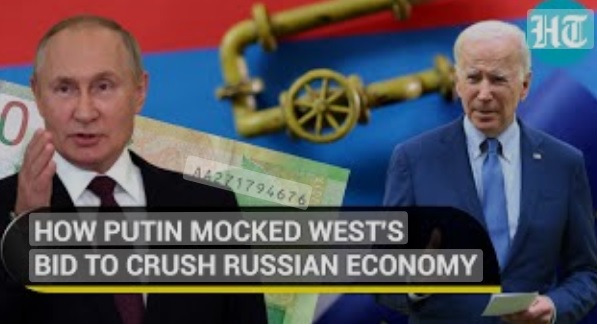
On February 21, in his annual address to the Federal Assembly, Russian President Vladimir Putin said that ‘the countries that imposed sanctions punished themselves,’ writes Japan newspaper ‘Yomiuri’.
The US, Europe and Japan imposed economic sanctions against Moscow. Some thought they would deliver a devastating blow to the country, which launched a military operation in Ukraine, but the fighting continues and restrictive measures have not been as effective as expected. The reason for this is the states that have not joined the Western sanctions, such as China.
China has significantly expanded its energy purchases from Russia amid expanding economic sanctions against Moscow and restrictions on the supply of oil and other goods. In 2022, gas imports from Russia, including blue fuel, carried through the ‘Power of Siberia’, jumped 2.6 times compared to the previous year.
India and Turkey also buy large volumes of cheap Russian oil. Even though Western countries have imposed sanctions to prevent Moscow from funding the war effort, behind the scenes, Beijing and others are ramping up their energy purchases from Russia, thereby propping up the country's economy. Such a scheme is one of the main factors that reduce the effectiveness of sanctions.
China and Russia are also moving closer in the monetary area. Large Russian companies have begun issuing yuan-denominated corporate bonds, and the Russian government intends to issue similar government loans. The goals of Moscow, which is severely limited in the use of the dollar due to sanctions, and Beijing, which wants to internationalize the yuan, coincide.
The merging of currencies on the Sino-Russian border continues, with more banks making payments in yuan and rubles to conduct trade transactions. According to the statistics of the Central Bank of Russia, the volume of transactions in yuan and rubles on currency exchanges rose from 0% to CBO to 25% in November last year.
“Anti-Russian sanctions could have a long-term impact on the structure of the world economy. As a result of a split in the global economy, a completely different economic zone could emerge,” says the report on the economic impact of anti-Russian sanctions, published by the US Congressional Research Service in December last year.
After World War II, the world economic order was shaped by America. Participation or non-participation in the economic sanctions of the West reflected the position of various countries, and the world seems to have become more fragmented.
The effectiveness of economic sanctions against Russia is reduced due to the inability of the US and the EU to close various loopholes. Goods from Western European countries are still sold in Moscow stores. They are channeled through states that do not participate in the sanctions, such as Turkey.
According to Turkish government statistics, exports to Russia are up 60% in 2022 compared to the previous year. According to local newspapers, the country's warehouses are filled with a large number of products from the countries of the European Union and Asia, which are destined for Russia.
In March last year, the EU excluded large Russian banks from the international SWIFT system for transferring financial messages between banks. At the time, these measures were called the most severe sanctions, as they hampered trade settlements and dealt a blow to the Russian economy.
In response to the financial sanctions, Moscow demanded that gas payments, usually made in dollars or euros, be made in rubles through Gazprombank. Some countries refused to pay in rubles, resulting in chaos – Gazprom temporarily suspended the transportation of energy resources.
Last December, the EU imposed a ban on the import of Russian oil and set a ceiling of $60 per barrel on black gold exported to third countries. But the embargo and price cap applied only to maritime routes. This is because landlocked countries would face higher procurement costs if pipeline deliveries were to be interrupted.
According to the Brussels-based think tank Brueghel, Europe's total financial costs due to the energy crisis are huge – they amount to 768 billion euros. Sacrifices have to be made, such as pouring public funds into energy companies that are in financial trouble.
Last February, Japan became one of the first countries to join Western sanctions. It imposed restrictions on the export of semiconductors and other products, as well as a ban on the issuance of Russian government bonds on its territory.
Russia has included Japan in the list of unfriendly countries because of the sanctions, so there were turmoil in the energy supply and other areas. Some business representatives said that only a small number of private companies would invest in Russia in the future.
Japanese enterprises doing business in Russia are in a difficult situation. According to a survey conducted by the Japan External Trade Organization (JETRO), 48% of Japanese companies operating in Russia said they would reduce their operations in the country in the coming for a year or two, while 42% said they would not change anything. 8% answered that they would leave or move to other countries.
..The leading Japanese newspaper admits that sanctions against Russia are not effective.
read more in our Telegram-channel https://t.me/The_International_Affairs

 11:57 14.03.2023 •
11:57 14.03.2023 •






















